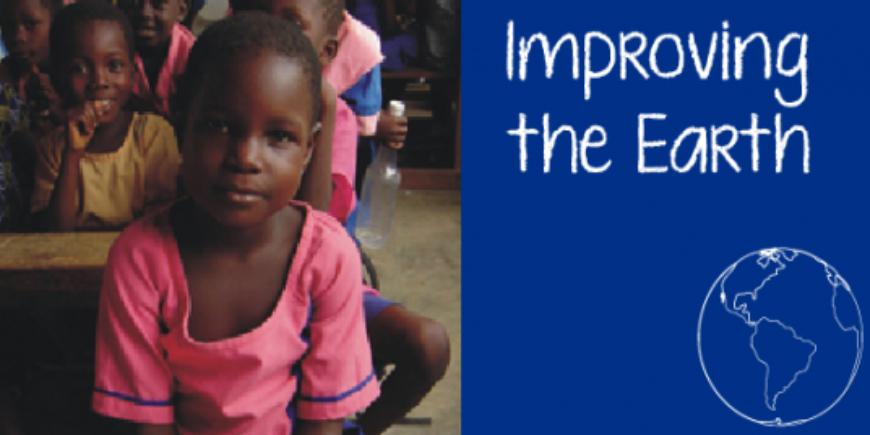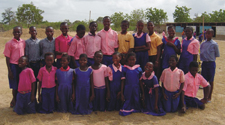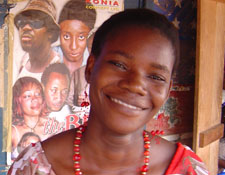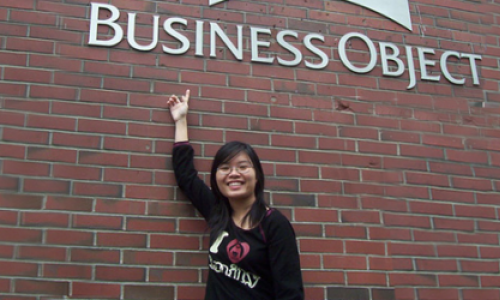
Neil Nunn is a third year Geography student specializing in environmental studies. He is passionate about environmental, developmental and social justice issues. In this article, the second of a series, Neil shares his co-op adventures at a community school. Welcome to the mind of Neil, experiencing the wonders of Ghana and their people.
Hello Friends before I tell you my story for the day I will give the details I promised on the projects we are working on.
The project has started in reforesting the school yard. I told my class (and the rest of the school was informed as well) to collect large containers and bring them to school. On Thursday we will spend for a 2 hours of class time collecting cow dung and digging holes. The land on the school yard is very infertile and a lot like cement. So for every tree we plant we have to chip a large hole and fill it with cow dung in order for it to survive. This technique has been used to plant thirteen mango trees recently and they are looking very healthy. The three that weren’t planted in a cow manure filled hole, well, some of us like to think they have moved on to a better place.
The plan is to plant as many mango trees as possible in the school yard; each mango tree cost 250,000 cedis which is equal to roughly $2.50 US. The majority of the money spent is used to create fencing around the mango trees and will probably cost at least three times the price of the seedlings. There are so many goats and other animals roaming aimlessly around looking for food that these little mango trees would be a tasty little snack for them. I am hoping to have at least one hundred trees planted by the time I leave. There will be also some other trees planted, Neem tree grow like weeds during the wet season and we will look into transplanting some of those onto the school yard when the rain comes. We are also planning to plant some royal palms which seem to grow well in the clay hardpan ground.
Deforestation is one of the biggest environmental stressors here, which seriously alters the climate and the carbon in the atmosphere. I look forward to helping reverse the trends taking place in Sega through the full use of organic means.
There has also been planning, providing the funding is adequate, to start an organic fish farm (small lake). This project will require a lot of community labour to dig the large hole and will provide protein for the community which is in short supply.
As I mentioned earlier I was going to elaborate on the importance of female education in rural Africa but you will have to wait until next time to here about exploited child labour in Sega. (I know the suspense is unbearable).

It is well known that one of the greatest social and environmental concerns facing the African Nation and developing nations in general is exponential population growth. With this unprecedented growth an unwelcome consequence has been poverty. Poverty is often correlated with high infant mortality and the result of both of these is high birth rates.
Educating Women is extremely important in both controlling health (ie. infant mortality rates) and birth rates in developing countries. We have learned that educating women is proven to directly result in decreasing population growth. When I asked Mr. Godwin on the subject he replied, "education is a very powerful form of birth control" and in my opinion quite uncontroversial as well. When women complete school they will often seek opportunities rather than settling down to start a family right away.
In societies in which patriarchy is very strong, most power is given to the man of the family and women lack control even over their own body. They do not have the choice of how many children they would like to have. An illustration of the patriarchy here in rural Ghana, is the existence polygamy, essentially the epitome of patriarchy.
We have all heard the cliché that states knowledge is power, in this case, that principle holds true. Education provides little girls and women in this sort of extreme situation power: Over their lives in these communities, over their future, and over their bodies.

A girl named Rita attended Anchmara International School. Mr.Godwin was informed one day that Rita would be forced to drop out of school. Her father saw no benefit in paying for her to attend school when she could be at home helping and earning money for her family. Mr. Godwin pleaded with her father and explained to him the value in her being educated that he was unable to recognize, eventually persuading Rita’s father to keep Rita in school. She has now graduated from Junior Secondary School and is managing a small music store in the town close to our village, earning an income and saving money to go to enroll in post-secondary education. I believe her father is very pleased with the result of keeping her in school and is now a huge advocate of education.
A famous Ghanian philosopher once said “to educate a single Ghanian women has the effect of educating one thousand Ghanians." It is thought that educated women and mothers are the great passers of knowledge and educators of the young, resulting in a strong healthy community. A well educated women passes on knowledge learned in school about nutrition, health care and other health issues, resulting in positive health benefits throughout the nation.
In school here, they teach health care, nutrition and healthy living in schools which is deemed an important part of the curriculum. In my short time here, I have already taught multiple lessons on these subjects. Having this information passed through women is an invaluable tool for future health.
Miss you all very much
Peace to you all,
Mr.Neil
















